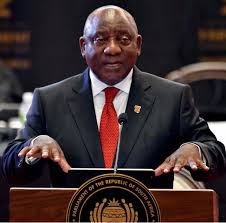President Cyril Ramaphosa has defended the importance of the state capture commission, saying the government has recovered R11-billion in stolen funds and four state capture-related cases were concluded.
Ramaphosa said he has sent a report to the Speaker of Parliament, Thoko Didiza, and the National Council of Provinces chairperson, Refilwe Mtshweni-Tsipane.
The report covers progress made up to the end of the 2024/25 financial year.
He said the Special Investigating Unit recovered R2.9-billion, while the asset forfeiture unit secured R8-billion.
Ramaphosa stated that another R10.6-billion worth of assets was under court preservation or restraint orders.
Major financial recoveries include settlement amounts of R2.55-billion from ABB, R1.16-billion from SAP, and R1.16-billion from McKinsey.
218 criminal investigations
“The integrated task force, led by the National Prosecuting Authority, is actively implementing 218 criminal investigation recommendations across multiple state capture focus areas.
“As of March 2025, 21% of these cases were either finalised or enrolled for trial. Just over half were under active investigation. Several high-profile cases are scheduled for trial through 2025-2026,” said Ramaphosa.
These include cases linked to the Free State asbestos project, SA Express, Bosasa contracts, and corrupt dealings at Transnet.
Speaking at the South African Council of Churches’ National Church Leaders Anti-Corruption Conference held at FNB Bank City last week, former chief justice Raymond Zondo expressed disappointment in the Directorate for Priority Crime Investigation (Hawks) in the handling of the Zondo commission matters, particularly Transnet corruption.
Zondo believes the now-defunct Scorpions unit was far more effective in investigating matters and conducting arrests.
Ramaphosa said steps had been taken to hold those responsible to account and to rebuild public institutions damaged by years of corruption.
He said the actions outlined in the report show that the government is serious about fixing the problems exposed by the commission.
“The progress outlined in this report demonstrates our unwavering commitment to ensuring that those responsible for state capture are held accountable and that the systemic weaknesses that enabled this assault on our democracy are permanently addressed,” said Ramaphosa.
Body’s powers to prosecute
He said of the 60 actions set out in his original response plan in 2022, nearly half have been completed or are close to completion.
About a quarter are still on track, while just under a third are delayed but receiving attention.
On institutional reforms, Ramaphosa said the government had acted to prevent similar events from happening in the future.
One of the biggest challenges, he said, was the establishment of the investigating directorate against corruption, which was made permanent through the National Prosecuting Amendment Act of 2024.
He highlighted that this new body now has stronger powers to investigate and prosecute high-level corruption.
“South Africa has implemented comprehensive anti-money laundering reforms through the General Laws Amendment Act of 2022, addressing all the deficiencies identified by the Financial Action Task Force.
“Among other things, these measures have resulted in a 40% increase in compliance with anti-money laundering requirements between 2023 and 2024,” said Ramaphosa.
He said the Public Procurement Act of 2024 was another major step forward, bringing all procurement processes under one clear legal framework to improve transparency and reduce corruption.
Professionalising public service
In the intelligence sector, the government disbanded the State Security Agency and replaced it with two separate bodies: one for foreign intelligence and another for domestic intelligence.
He said progress has also been made in professionalising the public service, emphasising that a national framework now guides how senior officials are hired and monitored.
He noted that a key element is the introduction of mandatory lifestyle audits, especially for officials involved in procurement.
By the end of 2024, 138 departments had implemented these audits.
“The companies and Intellectual Property Commission has completed reviews of 10 private sector entities implicated in state capture, with six investigations ongoing.
“The National Treasury imposed a 10-year ban on Bain & Co from doing business with the South African state, running from September 2022 to September 2032,” said Ramaphosa.
He said professional bodies have also taken action, with one chartered accountant permanently disbarred and fined R6.1-million.
Various new laws passed
Several new laws have been passed to close the legal loopholes exposed during the state capture era.
The Electoral Matters Amendment Act now makes it a criminal offence to donate to a political party in return for contracts or influence.
The Judicial Matters Amendment Act introduces corporate responsibility for failing to prevent corruption.
“However, our work is far from complete. We remain committed to the full implementation of the State Capture Commission’s recommendations and to rebuilding public trust in our institutions,” he said.




